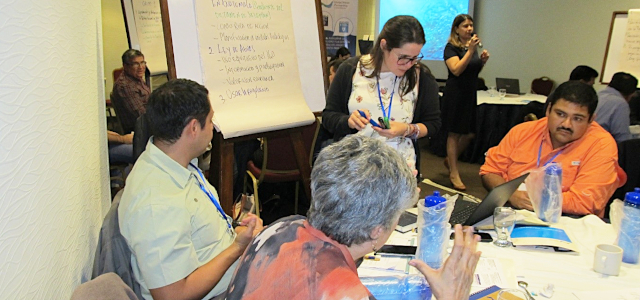Water is important for nearly every SDG and is fundamental for the achievement of the overall 2030 Agenda for Sustainable Development. Managing water between users and uses is the basis of IWRM and is captured in SDG target 6.5. Progress on this target is measured through indicator 6.5.1 – degree of IWRM implementation.
UN Environment is the UN custodian agency for indicator 6.5.1, and in 2017 UN Environment-DHI Centre engaged with countries to establish a baseline for IWRM implementation in UN Member States. The SDG 6 IWRM Support Programme contributed to this assessment through the organisation of multi-stakeholder workshops in over 30 countries to help facilitate the collection of official country data for 6.5.1. The baseline results for more than 170 countries are available in the IWRM Data Portal.
The next step for the programme partners is to support selected countries that wish to move forward on SDG implementation through the application of IWRM. So far, Ghana, Kazakhstan, Vietnam and Guatemala have been assisted – with Guatemala being the last of the four to initiate the process through a national workshop.
42 representatives of national government agencies, civil society, universities, NGOs, the private sector and the donor community of Guatemala – all with a stake in water management – participated. The event was organised by the Ministry of Environment and Natural Resources (MARN) in coordination with the Secretariat of Planning and Programming of the Presidency (SEGEPLAN), and with the support of GWP Central America and GWP Guatemala. With the results of the workshop, a proposal for an SDG IWRM Action Plan for Guatemala will be prepared.
“The workshop was an important opportunity to share the results of the baseline for SDG 6.5.1 with water actors from different sectors, including the private sector. Participants demonstrated commitment to the process and one of the most immediate conclusions from the workshop was the need to generate multisectoral mechanisms/spaces between stakeholders to identify common actions that can contribute to improved water resources management in the country,” says GWP Executive Secretary Fabiola Tábora.
Unique opportunity
The SDG 6 IWRM Support Programme is a key component to facilitate a focused and coordinated approach to the monitoring and implementation of SDG 6 – it helps countries to design and implement responses that promote measurable progress.
”We have very big ambitions for the programme! However, we are taking humble first steps through a staggered roll-out process, as this is a new learning experience for all involved. The aim is to build on the good work so far, adjust and adapt to meet the demands of countries, and be able to clearly demonstrate the value of engaging. While it is too early to begin to talk about replicating the programme for other indicators and targets, this could be worth at least considering in the not-too-distant future,” says Gareth James Lloyd, Senior Programme Advisor at the UN Environment-DHI Centre.
He is pleased with the collaboration with GWP: ”Our organisations have a long history of working together - from policy formulation work, to on-the-ground project implementations. While we operate in the same space, we have complementary skill-sets and interests. This programme is an excellent example of how we successfully collaborate to achieve a common objective. There is a lot of professional respect between the individuals involved, and the fact that we like each other on a personal level, makes the work even more rewarding.”
GWP Senior Network Specialist Francois Brikké agrees and points out that the programme has strong benefits to the countries: “This is a unique opportunity for countries to make progress on the water management issues that have been lagging behind, and the impact of the programme has the potential to be significant. Remember that all of this is part of a global process – the UN General Assembly takes stock on the progress towards Agenda 2030, and the results from the SDG 6 IWRM Support Programme events feed directly into this process.”

